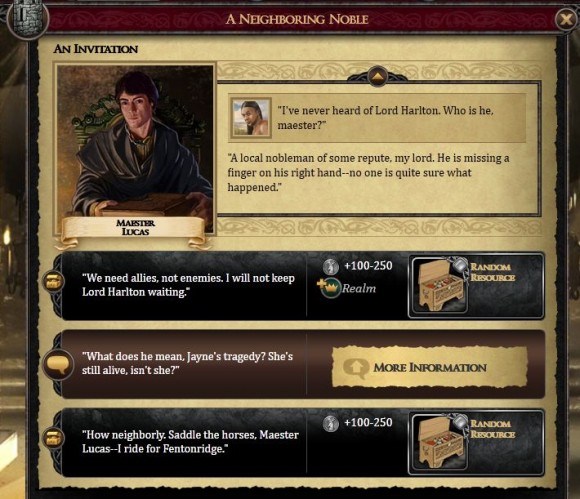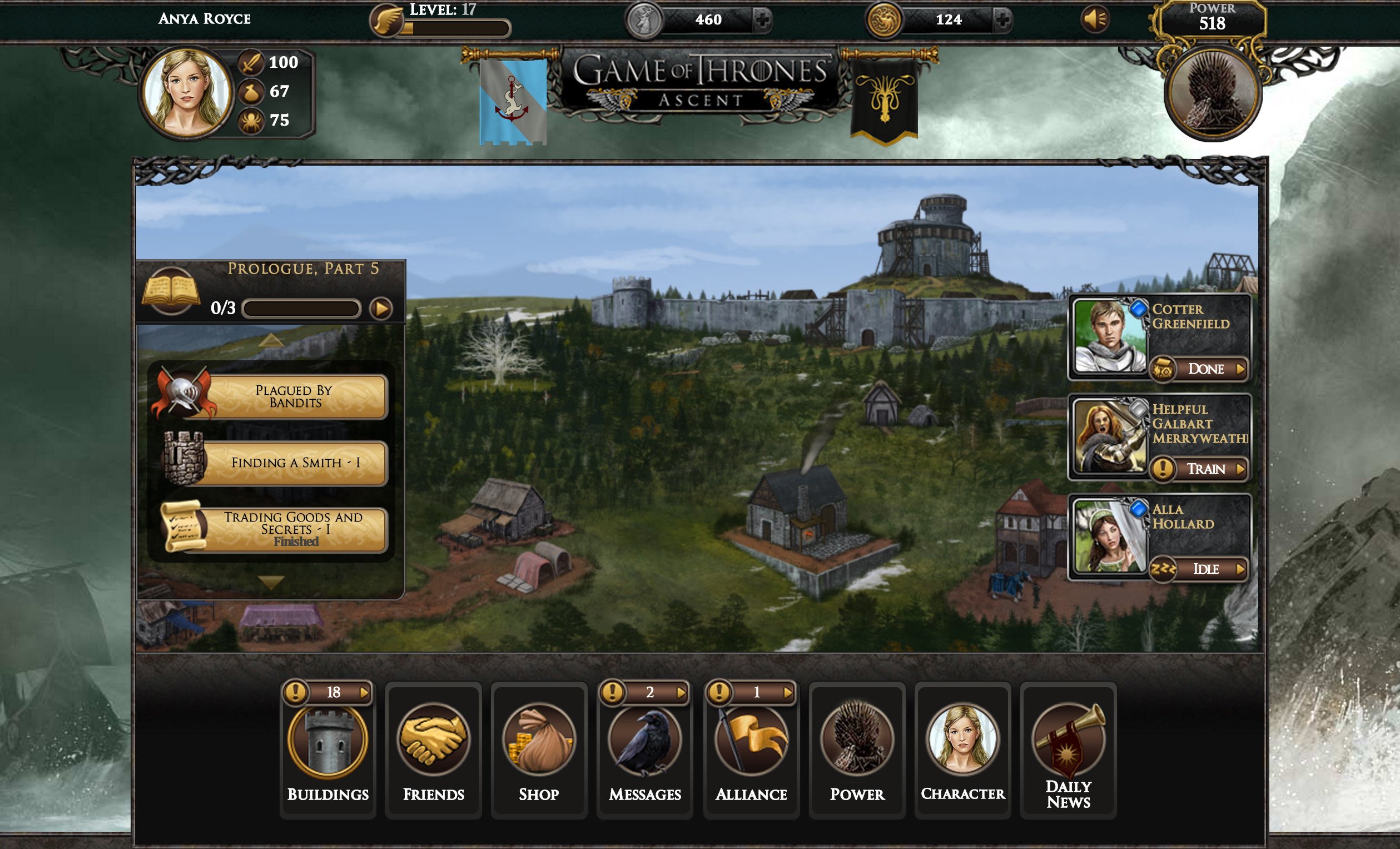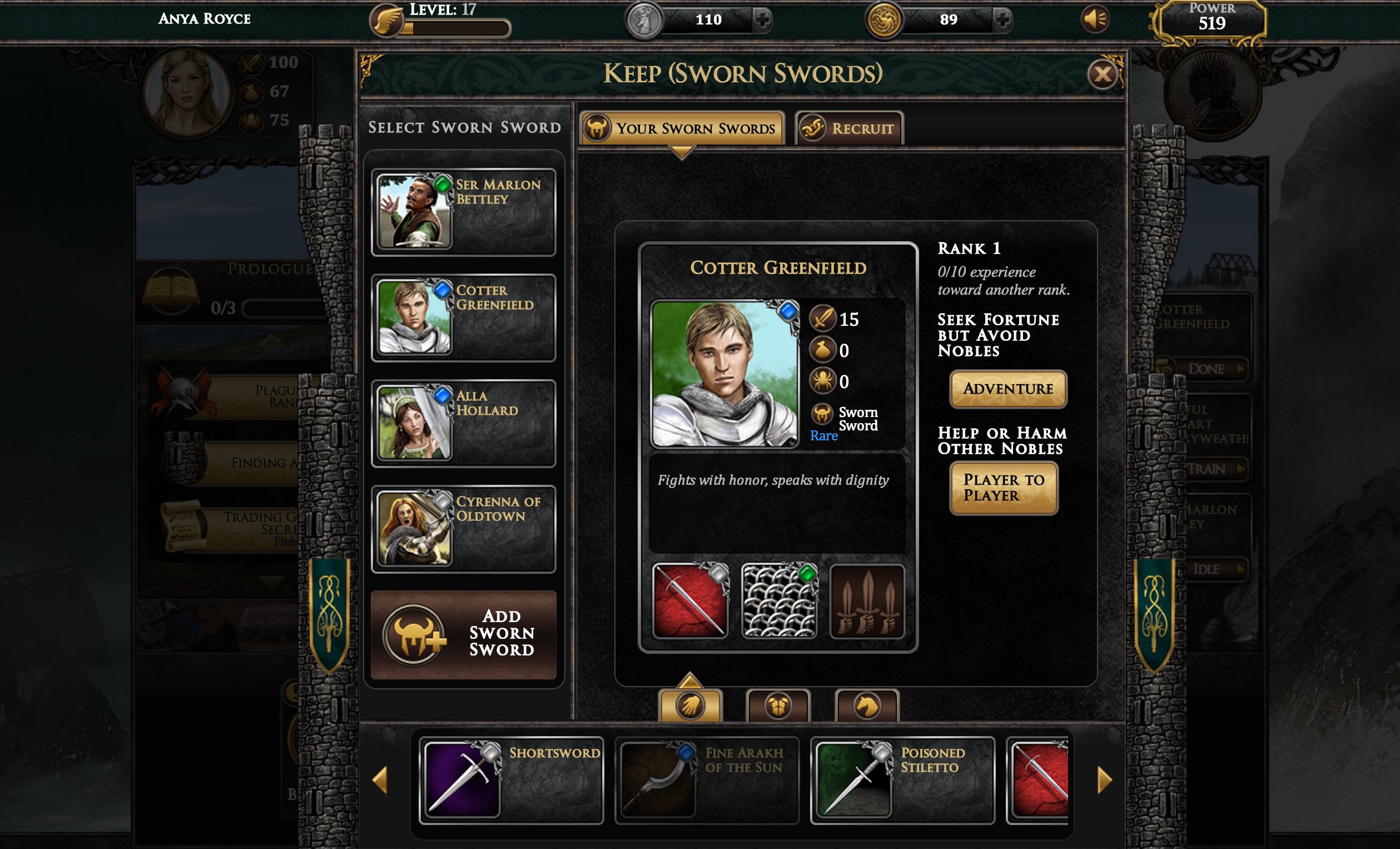It came as a not-so-thrilling anouncement: there was going to be a Facebook game with the "Game of Thrones" licence, called "Game of Thrones: Ascent". I didn't even have a Facebook account, but since I have a soft spot for licences, video games and broken things, I registred and joined the current open beta for the game. I have to say, it was more than a pleasant surprise. Although really offering next to nothing on a mechanical level (clicking buttons and waiting a lot), the game captures the feeling of "A Song of Ice and Fire" better than its two predecessors who seemed to use the licence more to pop up their respective games than to really deliver on the lore. And this is, weirdly, where "Ascent" shines.
The game starts with you designing your lord. You gain a portrait, give yourself a name and choose a background from a set of predefined ones that explain why you were elevanted to lordship. That's the first really smart choice the developers did: you're a very small lord of dubious power, and no real player in the game of thrones. Your first mission actually is to free your future seat from some slavers who use it as a base of operations. Humble beginnings, indeed. You also choose an allegiance to one of five great houses that come with unique skill trees, laying emphasis on certain game aspects: Stark (Aid), Lannister (Swindle), Baratheon (Fight), Greyjoy (Harass), Targaryen (Spy). The choices seem a bit odd, especially Greyjoy and Targaryen seem out of place somehow, but I am playing Baratheon and can't really tell whether it makes that much a difference. If you do, tell me.
.jpg) |
| A lord sworn to house Lannister. |
So, I created my character. I called him Edmure Smallpebble (feel free to add me); Edmure in honor of Edmure Tully, the best lord there is (from a smallfolk perspective) and Smallpebble to shout out to the world that I really didn't intend to ascent to the Iron Trone or anything. Just want to be a lordly lord. I also chose a banner (a chalice against a striped field of red and blue, representing a bountiful harvest against the Tully colors). Unfortunately, I couldn't choose Tully as an overlord, so I took the next best thing with Baratheon (didn't want to be of the North, too clicheed, you know). The first missions involved me in meeting my new advisors: a maester, a merchant, a spy master, and so on. Everyone of them has a nice bit of personality, and their advices really fit into the world (the slimy merchant type always tries to cheat other people for the better of the house, while the septa wants you to honor the authorities above and below).
 |
| The maester, presenting me with choices. |
The gameplay is divided into three parts. First, you have the managment of your lands. You can expand your seat with new buildings, or upgrade said buildings (smithy, workshop, market, you get the idea). Every building can produce stuff, and most stuff uses up resources. Producing stuff always takes one resource, though - time. Whenever you do anything in the game, you will face a loading bar that'll tell you how long you have to wait until the action is finished, usually between one and six hours. This part is fun enough, and I like making my lands stronger one upgrade at a time. But I certainly wouldn't waste that many refreshings of that one page if it wasn't for the other parts.
 |
| The main screen. Your new buildings will be added to your lands in the background, which you can scroll 360 degrees. |
There is a main story told in form of volumes that are divided in chapters. A small set of characters, especially your advisors and your troublesome cousin Kirth, take part in various quests. About half of them resolve around the story of the novels (Disruptor Beam, despite having bought the TV licence, are rooting their story pretty firmly in the books, including the TV deviations as they see fit). You will be there and help along, being able to choose between sides sometimes (so I fought with Jaime Lannister at the Golden Tooth, but fought against him in the Wispering Woods, always choosing the winning side). This seems pretty contrived at times, and the characters teleport around (Kirth takes part in the battle of the Golden Tooth, then joins Robb Stark at Moat Cailin to galop down to the Whispering Wood, after which he consoles Bran in Winterfell and so forth), which I found annoying at first but I did grow to it. Seems necessary for the more casual viewers and helps to create atmosphere, especially since the writers stick with what you know at the point: dialogue options in the early game allow me to support Joffrey as the "legitimate heir of house Baratheon", while I can switch my support to Stannis once he declares his claim.
 |
| Baratheon forces. |
The other half of the quests is entirely made up and resolves around your own holdings. Additionally to being an upjumped jackanape with no real nobility, some dark secrets wait to be discovered, and soon, jealous neighbors descent on you. These quest excel in transporting the "A Song of Ice and Fire" feeling, since their scope is just about right (perhaps two or three score of people involved at the most, and fairly mundane objectives like securing a local bridge or defeating another petty lord).
 |
| Sworn swords, ready for duty. |
This accomplishment gets even more impressive taking into account that the game mechanics are more or less trite. You get several dialogue options, but many times they lead to the same conclusion and just let you feel different. The choices you are presented with are more of style than of substance, but curiously, this produces much of the ambience: do I kill the captured deserter myself (gaining points on the Old Ways progress bar that has no game effect whatsoever) or do I give him to the headsman (New Ways), or do I simply imprison him because I can't decide (no effect)? In every instance, he's done away with, but you feel different about it, can compare your actions with your friends, and they contribute to your character as evidenced by the progress bars.
 |
| Holy progress bar, Batman! |
The same is true for the missions of your sworn swords: They can engage in a total of nine different actions, according to the three main talents (Battle, Trade, Intrigue), and a small button informs you of what the sworn sword will do when you click it. For example, the quest at hand is to clear some Ironborn raiders from a local village. You can fight them directly (Fight), aid the locals in their defense (Aid), shoot at them until they give up and retreat (Harass). You can offer them something in exchange for their retreat (Barter), bribe their leader (Bribe) or feign a larger force (Swindle). You can find out something that helps you (Spy), try to destroy their ships (Sabotage) or to steal their weapons (Steal). No matter what you do, you need to assign a sworn sword to the job (preferrably one that knows what he's doing, i.e. has the proper stats) and then watch a progress bar fill itself. You will get to know your chances beforehand, which might persuade you to alter course, but there is no real difference. Yet, for some reason, it feels different. Context matters, that's a lesson some big studios could learn here.
 |
| Chapters and volumes, providing context. |
Of course, the game is not without quirks. It's still in open beta, so many issues can be forgiven due to the hope of improvements (and there's a constant stream of updates coming in), but they need to really be fixed. The main issue for me is the performance: the game is laggy as hell. For something that really doesn't offer that much in graphics, that's unexcusable. Waiting times of several seconds after a click are common and rise as high as 20 seconds at times, which makes the game basically unplayable. Another issue is the imbalance of stuff that needs to activated with gold coins: while silver is earned in the game all the time, gold must be bought with real money (although there are plans that you can gain some in-game, too). And many items you can purchase with gold are ridiculously overpriced. There is a real danger that gold is necessary for being competetive, which is no good way to go. Instead, it should make stuff convenient, like it does in some areas (particularily allowing to row up resource collection, which takes 20 minutes to perform - with the ability to row six times you gain 120 minutes and don't need to check back constantly).
 |
| Waiting, always waiting. |
To conclude this review of "Game of Thrones Ascent Open Beta": it's the best "A Song if Ice and Fire" experience you are likely to get on PC. It's free to play, so there's no real reason not to play it. Despite the very trite mechanics, I am constantly clicking away at it and adding one more quest, one more resource, one more upgrade to my holdings. Try it out!









.jpg)

I am not a gamer myself, but because of GOT I have decided to try.
ReplyDeleteFirst - it was extremely slooow.
Second - I have chosen a female hero and my quest was the same as Yours. No looking for a good marriage contract or quarrelling with male chauvinist lords. And it made this game for me unbelievable. I cheer for female warriors, but in Westeros it is not so easy.
Yes, but that would double the amount of quests etc., and that's just not doable for a game company.
Delete